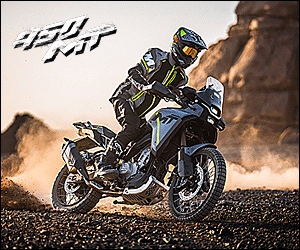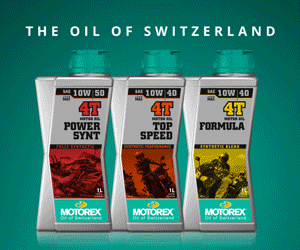Albert Arenas
2020 Moto3 World Champion
23-year-old Albert Arenas has become 2020 FIM Moto3 World Champion after playing it safe at the final race of the season at the Grande Prémio MEO de Portugal with a 12th place finish. The title marks KTM’s fourth in the class and 314th FIM crown, while Arenas becomes the Aspar Team’s ninth champion.
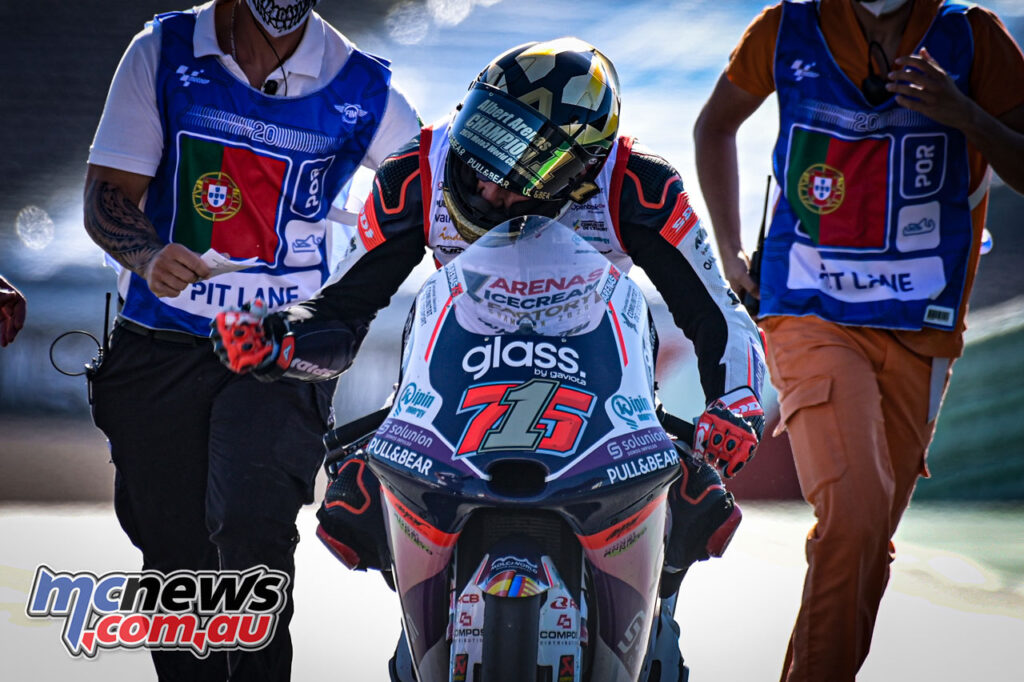
The result saw the KTM RC4 rider record his eleventh points-scoring finish in Portugal on Sunday, including three wins and a total of five podiums to lay his hands on the FIM gold medal and become the latest KTM Moto3 world champion after Sandro Cortese, Maverick Viñales and Brad Binder.
Albert Arenas – 2020 Moto3 World Champion
“I’m still enjoying the moment, I don’t really believe it yet what happened today! I knew it was a matter of time, races, we were close in the last races but there were many things we couldn’t control. What was in my hands I was trying to have under control, enjoy riding. But today we made it and it’s incredible. I started the race with a lot of energy, I wanted to push and do a great result and enjoy the race. Until half race distance I was really comfortable then I started to have some problems, I don’t know, nerves, the rear tyre… but it was ok. There was a moment I was suffering more then I got the pace again. The last lap was out of control, I was catching Arbolino and then it was a typical Moto3 moment with a lot of touches, everyone didn’t have anything to lose and overtook everywhere, but I was there. I was pushing and when I crossed the line it was a relief. We made it, but until I saw my team I didn’t believe it! It’s incredible.”

The Spaniard started the year with a win in Qatar, and sealed the deal in the final race of the season in 12th place with a lead of just four points clinching a hard fought season.
The title has been a long time in the making, with Arenas hitting the ground running in the CEV 125 Championship in 2011 to score solid points. The next year it changed to Moto3 and he took his first podium and pole position, and the season after that his first win in the series. The end of 2014 saw Arenas make his Grand Prix debut in the final round in Valencia, before 2015 proved one of his most pivotal seasons on his journey to becoming a World Champion.
The first year it became the FIM Moto3 Junior World Championship, Arenas gained traction from top fives early on to take podiums and then go on a winning spree to close out the season, ending 2015 in second overall after an impressive run. He made some appearances as an injury replacement in the 2016 Moto3 World Championship earlier in the year with Mahindra, before becoming a permanent fixture from Austria on.
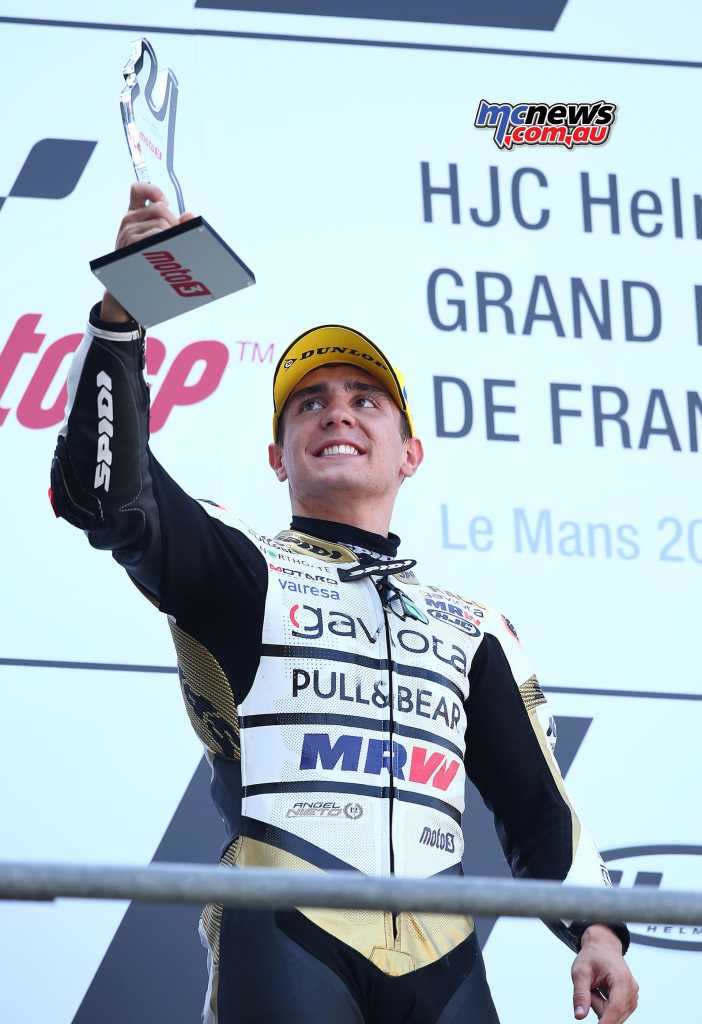
His first full Moto3 season in 2017 was a tougher one but Arenas scored points and took a top 10 in Misano before it all started to come together for 2018. After a tougher start, glory was just around the corner as the Spaniard took his first Grand Prix victory in a stunning French Grand Prix at Le Mans. He won again before the end of the year as he stood on the top step Down Under, having become a bona fide contender at the front.
2019 was more consistent. A victory came his way in Thailand that began a run of three consecutive podiums in Japan and Australia, with Arenas eventually ending the year 11th in the Championship on 108 points after one win, one second place and one third. Then came 2020.
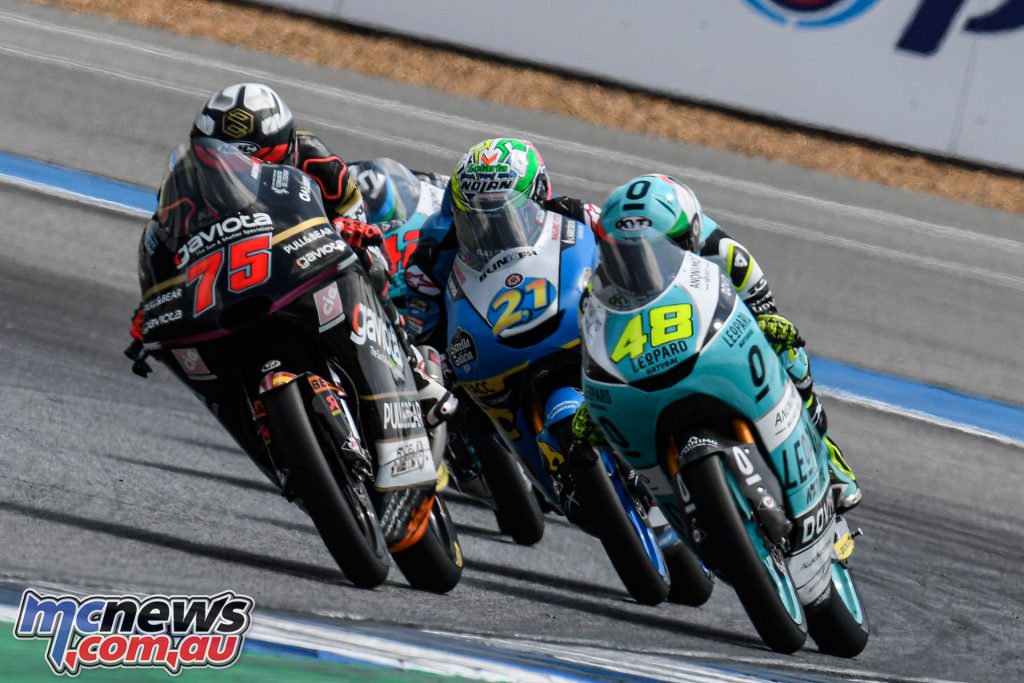
Arenas’ season began with a phenomenal victory in Qatar before COVID-19 put a halt to proceedings, and he would have to wait until July to reignite his title charge. But on home soil in Jerez, the number 75 proved he was the real deal with a second win in two to extend his lead at the top.
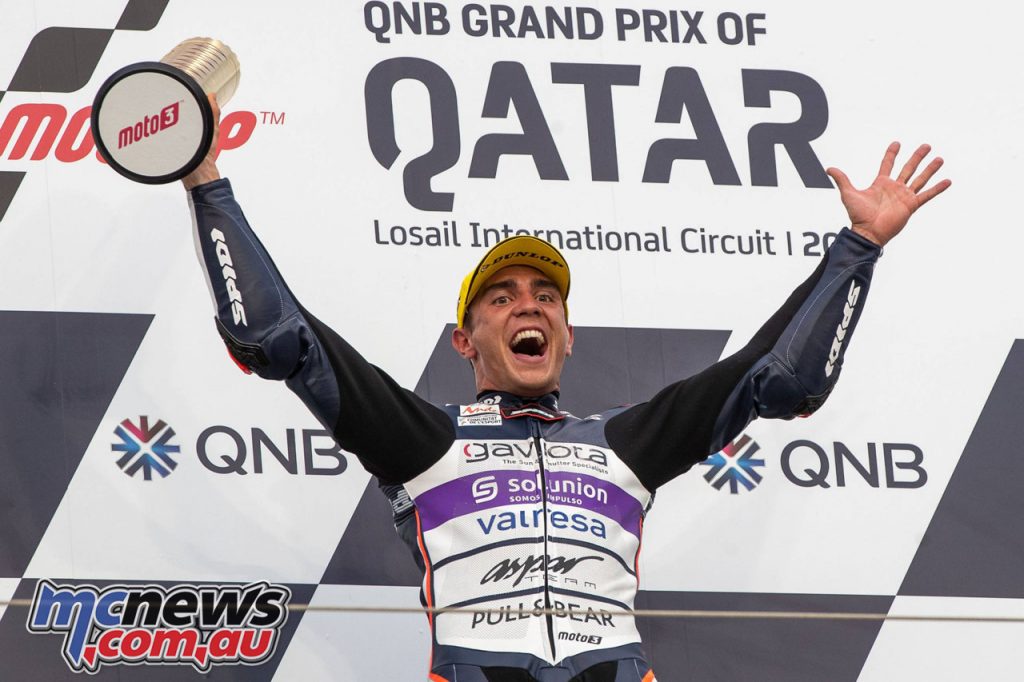
A DNF in the Andalucia GP was quickly put to the back of his mind with two more podiums in the Czech Republic and Austria, the latter a third win of the campaign, and Arenas seemed the secure favourite for the title. However, he wouldn’t return to the rostrum until the French GP, five races after Austria, as he was hit by DNFs and bad luck. Le Mans saw him back on the box after another impressive ride, and although that would turn out to be his last podium of the season, the points would prove crucial.
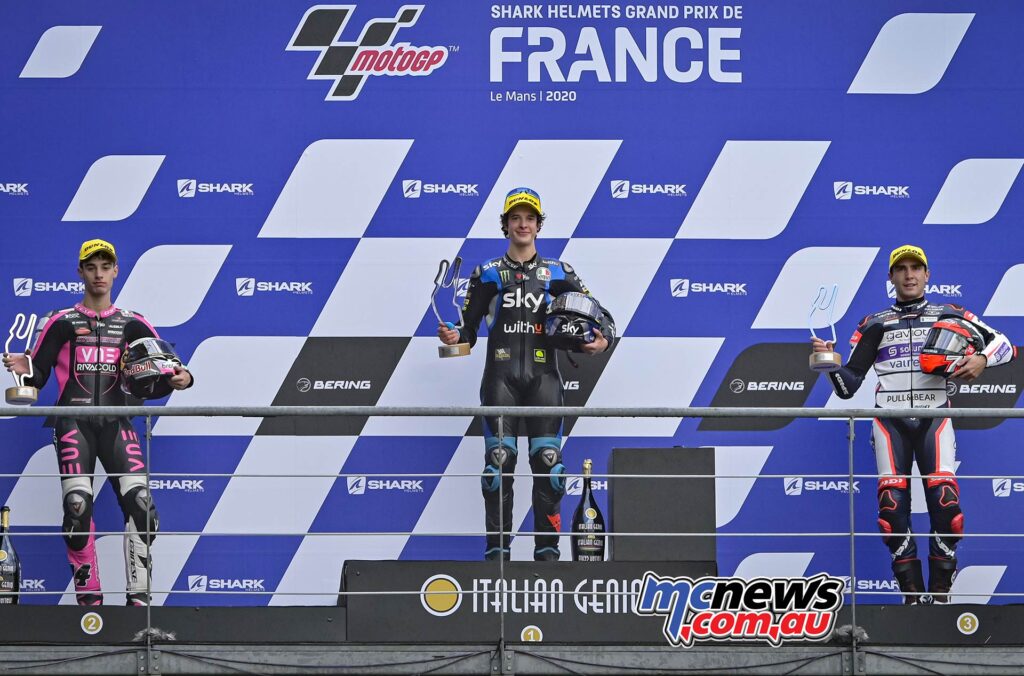
A tough European GP saw Arenas DNF and get DSQ’d, but he arrived in Portugal as the Championship leader with just two rivals remaining for the crown. In an outstanding final battle of 2020, a hard-fought 12th place under intense pressure was enough for the Spaniard to crown himself the 2020 Moto3 World Champion.
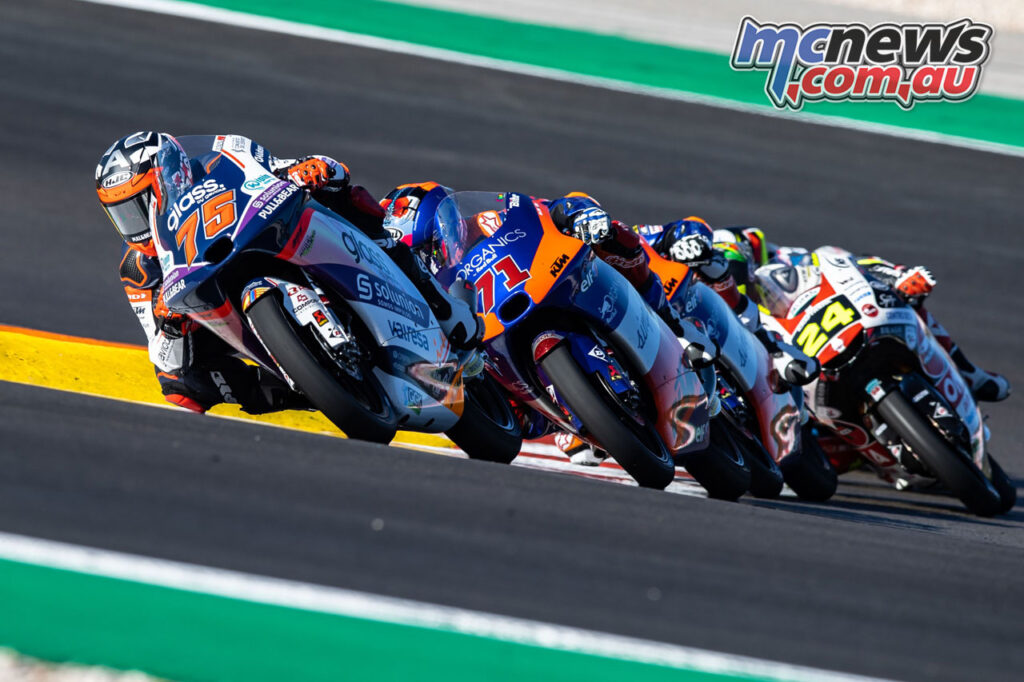
Albert Arenas talks winning the 2020 Moto3 title
How do you feel?
Albert Arenas: “It is incredible. I am still speechless. I knew that if I finished in front of my rivals, I would be champion, but I have not thought much about the title. I had problems during the race with the rear tyre and I tried to focus on riding. I just wanted to get a good result. In the end, there have been many touches in the group, they were all very aggressive. It was a typical Moto3 race. Until I saw my team on the corner, celebrating, I was not fully aware that we were World Champion.”
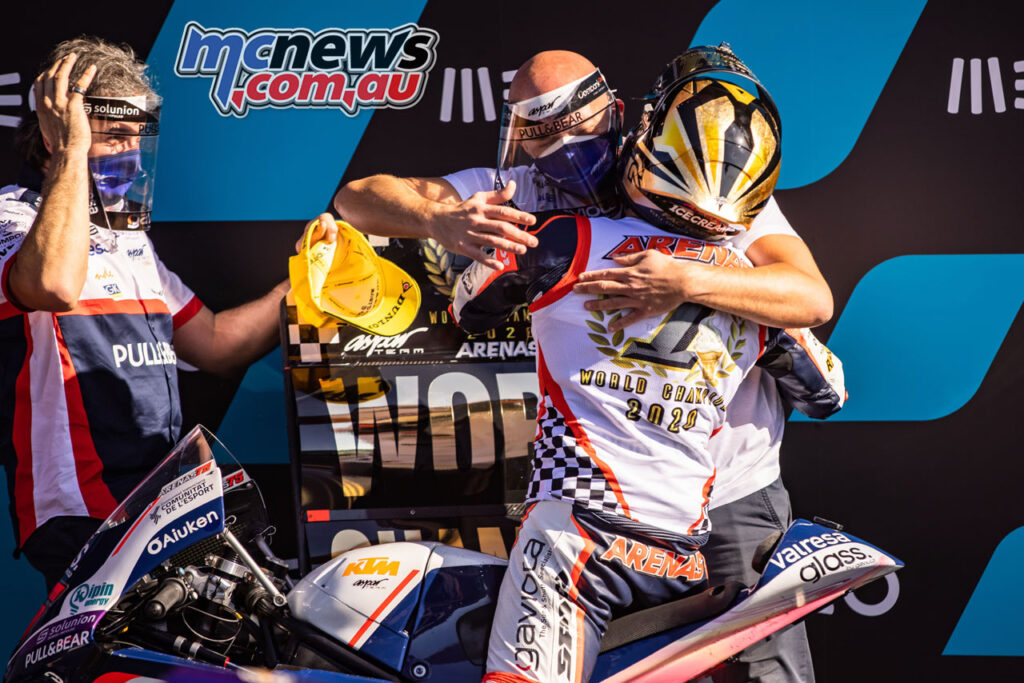
Where would you say this path to the title began?
Arenas: “It was a process, there is no date on which you say “from today, I will fight for the World Championship title.” Looking further back, for example, to when I made the jump to the World Championship, the dream has always been to be a world champion. It is clear that first you have to go through a learning process, to keep your feet on the ground: you cannot always win and you have to take steps. At the end of last year, with the victory in Thailand, I started to see what I wanted and the potential we had. That victory made me believe, then throughout the 2020 preseason we were building it, and now, here we are.”
Being the leader of the championship, just after achieving the first victory, suddenly you see that the world stops. What went through your head? How did you prepare to arrive in top form at Jerez and score another victory?
Arenas: “At first, when we return from Qatar, everything seemed to be something temporary and very short, we thought it was like a little break and we would return soon to activity. It wasn’t like that. There were people who told me that I was going to be a leader for a long time and I told them yes, but that I wanted it to be with races, not sitting at home. Those were months of staying in shape, trying to stay active, not losing that spark and that pace with which we started in Qatar after what we had done in the preseason. I think it was a tough time for everyone, but we got positive things out of that period.”
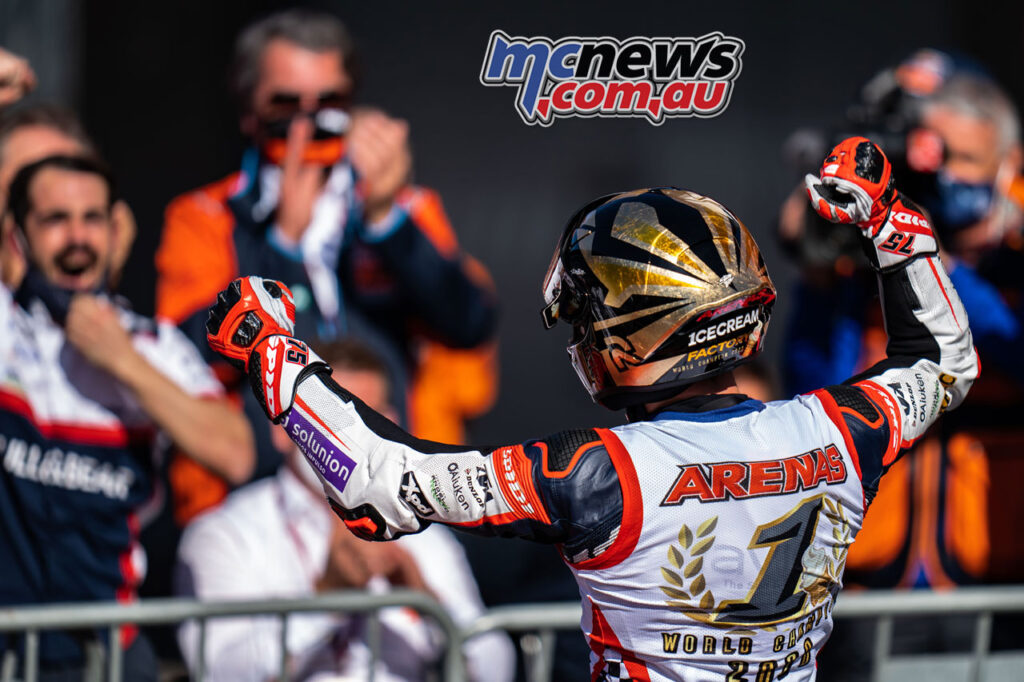
How did you feel in Barcelona, after the fall and seeing you, for the first time, in second place? Did your approach to racing change by becoming the pursuer, rather than the pursued?
Arenas: “The Catalan GP was a difficult moment, they took something that was ours from our hands, we did not lose it. It was part of the learning process this season. I was the leader for a long time, but after Barcelona I was second. In France, I regained the lead and learned to manage how to bear the pressure of being a leader, a pressure that at the same time is the best feeling, because you ride at your best, knowing that you are the leader and that it is others who have to force. You just have to keep doing what you are doing, enjoying it.”
You always said: “It is not yet time to think about the championship.” When did that moment come?
Arenas: “You have to start thinking about the championship when you can get it mathematically. If not, it does not make sense to anticipate, that can lead you to lose focus and put more pressure on yourself. Once there are mathematical options to get the title, that’s when you have to start thinking about how to manage it. Until then… Midseason, I didn’t want to think about it, but like it or not, it’s inevitable. The team also kept telling me, ‘if you can’t win, try to score, it’s important…’ and whether you like it or not, you’re already thinking about the championship there. After Barcelona, I took a step in that aspect.”

Your goal this year was to be regular and consistent. Do you think you made it?
Arenas: “We have managed to be very consistent in terms of pace and regular in terms of always being in the lead, to be able to win or make the podium. Then, what we have been able to translate into points is not what I liked. In the end, we have taken a step forward, we have managed to be regular and consistent in those positions. I already have more challenges for the future, to convert that regularity into more points.”
Have you learned to know when to risk and when not to?
Arenas: “More or less. It is more a mental issue, of how to face the race. Once on the track, I’ve always known quite well when to risk and when not to.”
Which would you say was the worst time of the year?
Arenas: “The worst moment was the first race in Valencia. In the second lap, having a 19-points lead, after being first in the warm-up session and having a very good pace, one of my biggest rivals, Vietti, fell, I managed to avoid him, and then a rider from behind hit me and broke my bike. That was the worst moment. It was a feeling of helplessness, not being able to fight with my rivals on the track for points. That was the worst moment after Barcelona.”
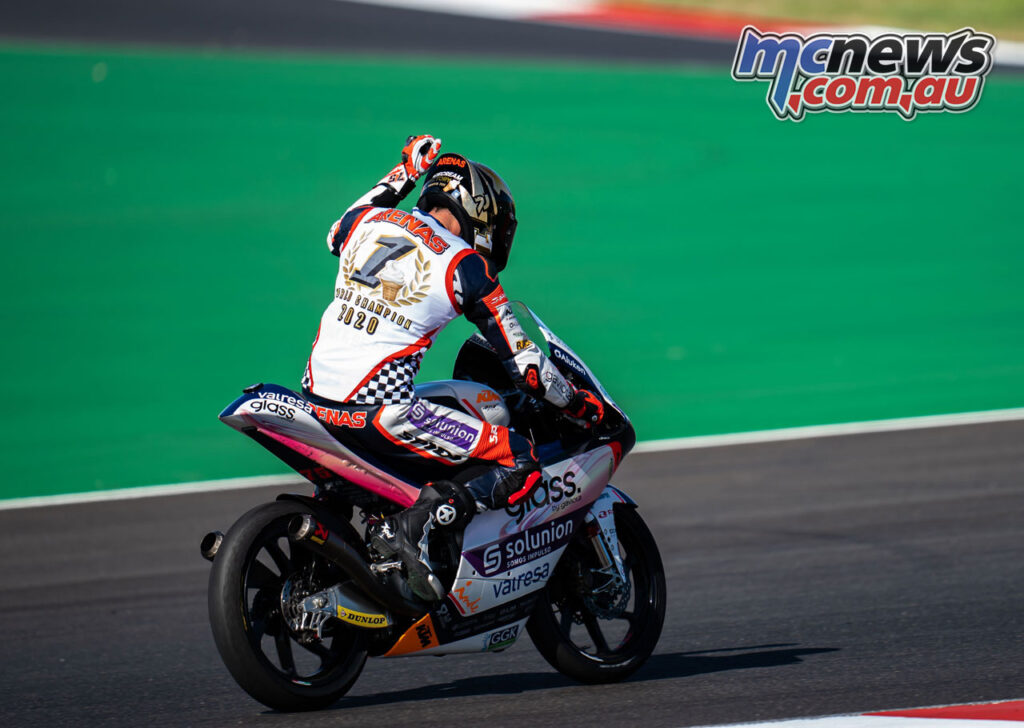
What would you say, if you could, to the four-year-old Albert who gets on a motorcycle for the first time?
Arenas: “In the winter of 2000, I tried a pocket bike for the first time and, if I could, I would tell him ‘enjoy doing what you do, but above all do not be in a hurry to grow. When we are children we really want to grow, to move forward, but there is no rush. Enjoy every momento; enjoying every momento, everything comes’.”
Everything comes, but, at the same time, there are moments in your career in which perhaps you have come to think: “this is not going to come”.
Arenas: “Yes, you think about things, you think, you think about it… but at no time did I think of something very definite. Last season I was trying to think about the situation I had, there were races left, I was with my bike and my team and there were still many opportunities. That was what made me push forward, what made me take that step in terms of riding and as a person, which has now led me to achieve this.”
How much do you want to get on the Moto2?
Arenas: “A lot, a lot… After a few years of learning and great memories, I am looking forward to a bigger bike, with more power, with wider tyres…. I have been training with the 600 for a long time and it is something I am really looking forward to.”
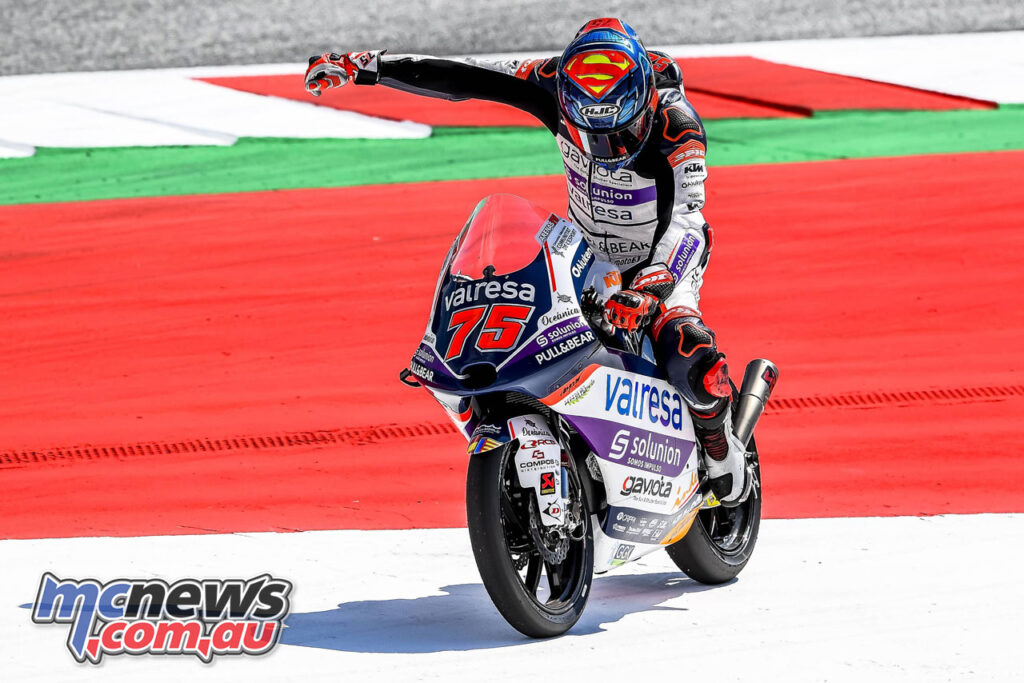
What will your goal be in 2021?
Arenas: “The objective is to reach the premier class, and being in Moto2 means being one step closer to achieving it. I want to continue being myself, as I have been this year, to continue enjoying every moment and to continue learning. That will lead us to get everything we want.”
Who do you dedicate this title to?
Arenas: “I can now think about that Albert who was little, who one day dreamed of being a world champion, and also about all the people who have helped me to be myself, to improve day by day and to make this possible.”
Team Aspar celebrates another title
Three new titles rest in the Aspar Team’s showcases after an atypical season in which the team’s hard work has paid off handsomely. The Aspar Team project in 2020 took part in five categories and closed the year winning three of them, with the title of Moto3 World Champion with Albert Arenas, the title of Moto3 Junior World Champion with Izan Guevara and the title of Champion of the European Talent Cup with David Alonso.

From the team’s alma mater first World Championship in 1986 with the 80cc Derbi, with victories at Jarama, Salzburgring, Rijeka or Assen, to the title of Albert Arenas. Jorge Martínez “Aspar” and the Aspar Team have shared the victory with Álvaro Bautista, Gábor Talmacsi, Julián Simón, Nico Terol, Aleix Espargaró in MotoGP or with young promises like Raúl Fernández or Izan Guevara.
From those races between straw bales in the streets of the villages in Valencia in the seventies and eighties, only the dream of a child who wanted to race on a motorbike remains. This child, Jorge Martínez, placed a Spanish rider at the top. Being the second most successful Spanish rider, only behind the late Angel Nieto, Jorge Martinez “Aspar” knew that his days as a rider would expire and decided to found the team that bears his name. The team’s first victory would be his, in South Africa 1992, but the first world title as team manager would have to wait until 2006.
It was the beginning of the new century when the Aspar Team legend was born. World champions, runners-up, victories, hat-tricks… successes followed one another to make Aspar Team a world reference. The first milestones, the runner-up years of Fonsi Nieto and Sebastian Porto in the 250cc world championship. The upward trend did not stop, and in 2006, under the guidance of Álvaro Bautista, the first world title arrived, in a season with an unprecedented event: three riders from the same team taking the podium and four of the five riders from the Valencia team in the top five positions in the general classification at the end of the year.
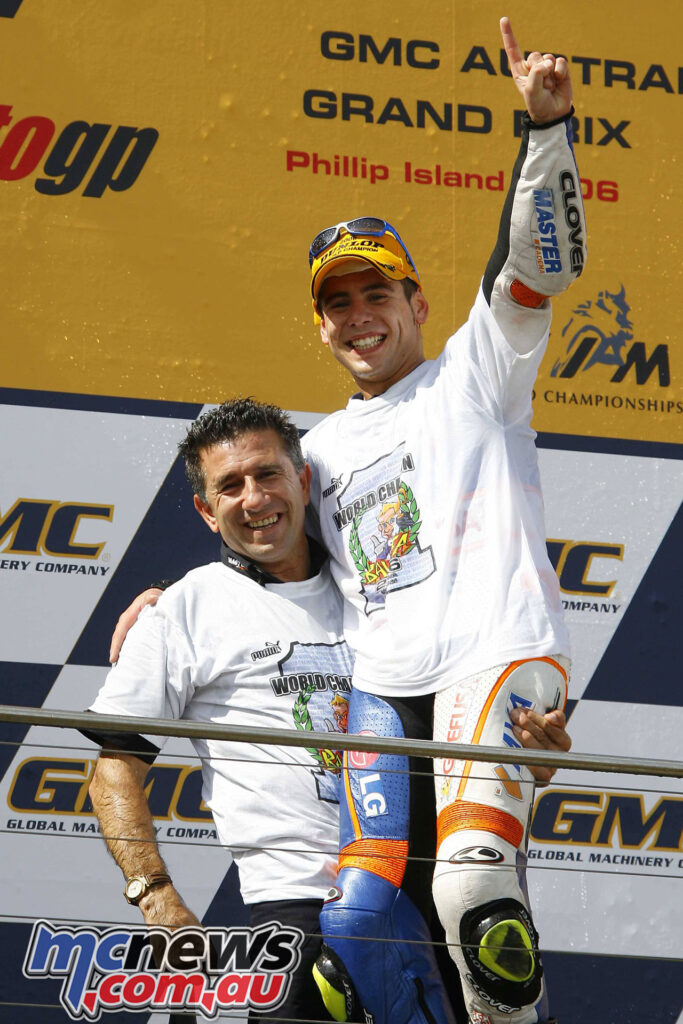
When everything pointed to the fact that it would be impossible to repeat a similar feat, the team did it again in 2007. Héctor Faubel and Gábor Talmácsi dominated the small category with an iron hand, prolonging their duel until the final episode in Valencia. The Hungarian took the braid and the Valencian was runner-up in the world.
The next chapter was written in 2009, this time in the figures of Julián Simón and Bradley Smith. The two fought for the title, preventing any other rival from interfering in the fight and making it clear that Aspar Team was one step ahead of its adversaries. The crown went to Simón, who along with runner-up Smith and the also inspired Sergio Gadea achieved eight podium doubles and another historic hat-trick at Assen.
2010 was a year of novelty, with the arrival of Moto2 and the team’s entry into MotoGP, and ended as usual, with two team riders, Nico Terol and Julián Simón, as runners-up in the 125cc and Moto2 worlds. Only a year later, the Valencian team saw in 2011 how a Valencian rider monopolised the season from start to finish under its guidance, to end up being crowned champion in front of his own fans, at the Ricardo Tormo Circuit, and in a purely Valencian team.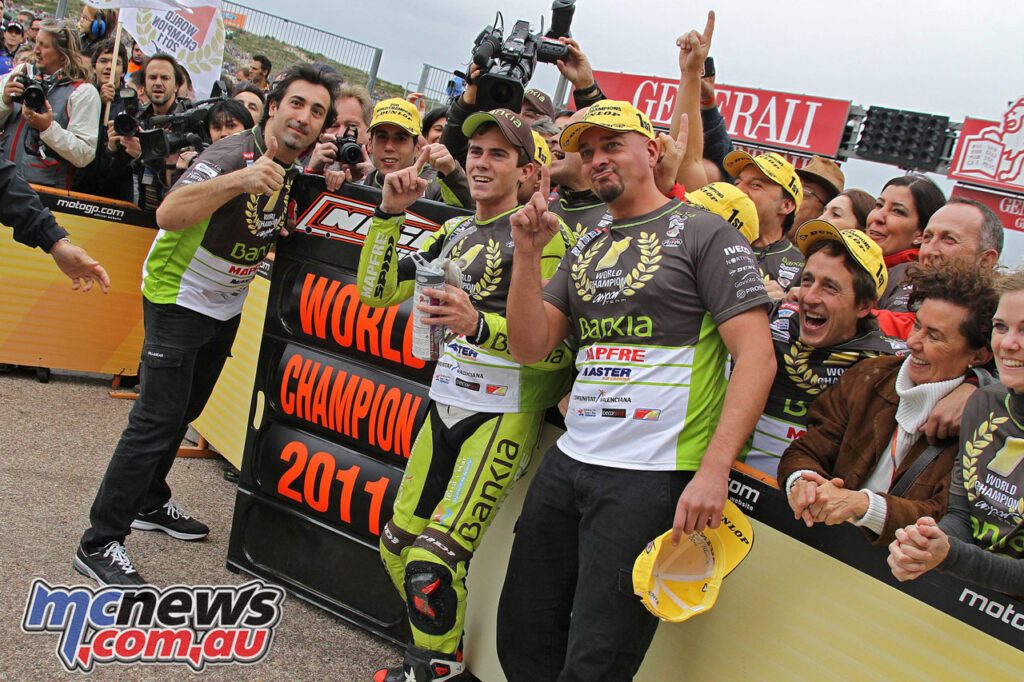
The undisputed leader in the smaller categories, MotoGP was the next stop and, in 2012, with the entry of the new CRT category, the Valencian team won again thanks to Aleix Espargaró and Randy De Puniet, with two CERT titles for the team between 2012 and 2013. Meanwhile, the team never gave up on the young riders, and in 2018, with the tribute to the late Angel Nieto and the renaming of the team as the 12+1 times world champion, the team achieved a new World Championship title, this time in the Junior Moto3 World Championship with Raul Fernandez. The work with the young riders and with Nico Terol continued to bear fruit in 2020 with the title of Junior Moto3 World Champion for Izan Guevara, who completed an extraordinary double with David Alonso as the winner of the European Talent Cup.
But the 2020 season was saving the best for the end, after an incredible year with Albert Arenas, in which he has proven to be the best in the Moto3 category, with three victories and five podiums. The road was complicated with two races outside the points in Barcelona and Valencia, but Albert Arenas always knew how to return to the track with strength to make it clear to his rivals that the title of World Champion was his, adding his name to a list which includes Jorge Martínez “Aspar”, Álvaro Bautista, Gabor Talmacsi, Julián Simón or Nico Terol.
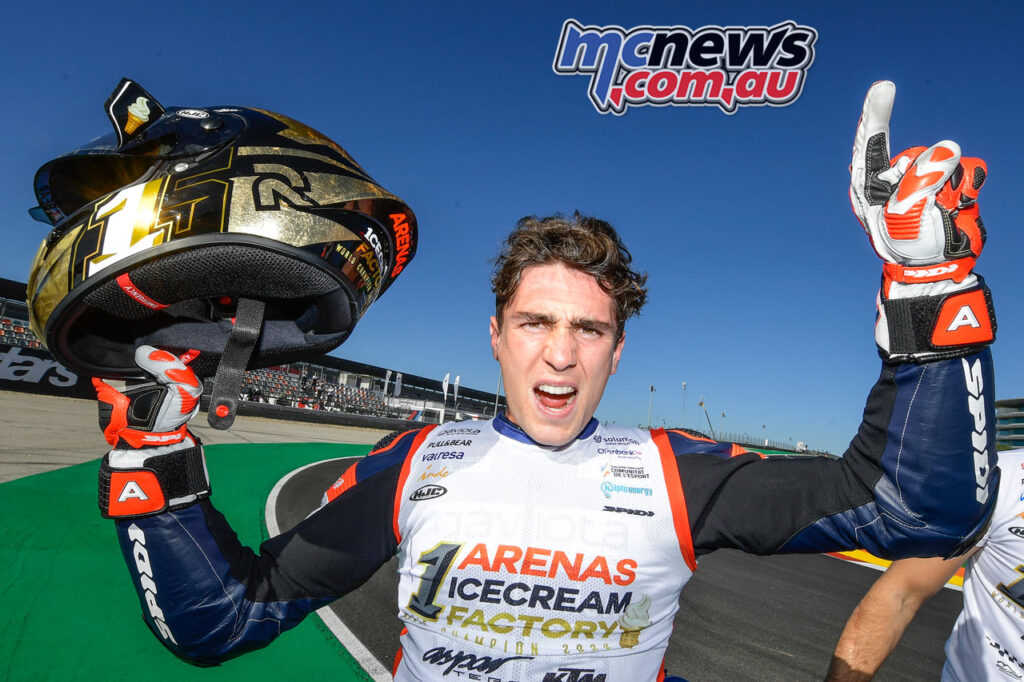
Aspar Team World Champions
- Jorge Martínez (1986, 80cc / 1987, 80cc / 1988, 80cc and 125cc)
- Álvaro Bautista (2006, 125cc)
- Gabor Talmacsi (2007, 125cc)
- Julián Simón (2009, 125cc)
- Nico Terol (2011, 125cc)
- Aleix Espargaró (2012, MotoGP CRT / 2013, MotoGP CRT)
- Raúl Fernández (2018, Moto3 Junior)
- Izan Guevara (2020, Moto3 Junior)
- Albert Arenas (2020, Moto3)
Aspar Team racing record
- 8 world runners-up
- 139 wins
- 377 podiums
- 3 European championships
- 20 Spanish championships
Moto3 Race Results
| Pos | Rider | Bike | Time/Gap |
| 1 | Raul FERNANDEZ | KTM | 38m06.272 |
| 2 | Dennis FOGGIA | Honda | +5.81 |
| 3 | Jeremy ALCOBA | Honda | +5.866 |
| 4 | Sergio GARCIA | Honda | +6.447 |
| 5 | Tony ARBOLINO | Honda | +12.998 |
| 6 | Darryn BINDER | KTM | +13.065 |
| 7 | Celestino VIETTI | KTM | +13.907 |
| 8 | Ai OGURA | Honda | +13.929 |
| 9 | John MCPHEE | Honda | +13.945 |
| 10 | Deniz ÖNCÜ | KTM | +14.438 |
| 11 | Niccolò ANTONELLI | Honda | +14.487 |
| 12 | Albert ARENAS | KTM | +14.708 |
| 13 | Ayumu SASAKI | KTM | +19.285 |
| 14 | Carlos TATAY | KTM | +23.195 |
| 15 | Kaito TOBA | KTM | +24.233 |
| 16 | Barry BALTUS | KTM | +24.26 |
| 17 | Ryusei YAMANAKA | Honda | +24.321 |
| 18 | Adrian FERNANDEZ | Honda | +24.425 |
| 19 | Stefano NEPA | KTM | +24.625 |
| 20 | Romano FENATI | Husqvarna | +24.672 |
| 21 | Andrea MIGNO | KTM | +27.637 |
| 22 | Yuki KUNII | Honda | +34.49 |
| 23 | Jason DUPASQUIER | KTM | +34.884 |
| 24 | Riccardo ROSSI | KTM | +35.003 |
| 25 | Maximilian KOFLER | KTM | +35.092 |
| 26 | Davide PIZZOLI | KTM | +35.216 |
| 27 | Gabriel RODRIGO | Honda | +40.329 |
| 28 | Khairul Idham PAWI | Honda | +46.973 |
| Not Classified | |||
| DNF | Tatsuki SUZUKI | Honda | 2 Laps |
| DNF | Jaume MASIA | Honda | 4 Laps |
| DNF | Alonso LOPEZ | Husqvarna | 7 Laps |
Moto3 World Championship Standings
| Pos | Rider | Points |
| 1 | Albert ARENAS | 174 |
| 2 | Tony ARBOLINO | 170 |
| 3 | Ai OGURA | 170 |
| 4 | Raul FERNANDEZ | 159 |
| 5 | Celestino VIETTI | 146 |
| 6 | Jaume MASIA | 140 |
| 7 | John MCPHEE | 131 |
| 8 | Darryn BINDER | 122 |
| 9 | Sergio GARCIA | 90 |
| 10 | Dennis FOGGIA | 89 |
| 11 | Jeremy ALCOBA | 87 |
| 12 | Tatsuki SUZUKI | 83 |
| 13 | Gabriel RODRIGO | 80 |
| 14 | Romano FENATI | 77 |
| 15 | Andrea MIGNO | 60 |
| 16 | Ayumu SASAKI | 52 |
| 17 | Deniz ÖNCÜ | 50 |
| 18 | Kaito TOBA | 41 |
| 19 | Niccolò ANTONELLI | 40 |
| 20 | Stefano NEPA | 38 |
| 21 | Filip SALAC | 30 |
| 22 | Carlos TATAY | 26 |
| 23 | Alonso LOPEZ | 21 |
| 24 | Ryusei YAMANAKA | 14 |
| 25 | Riccardo ROSSI | 10 |















